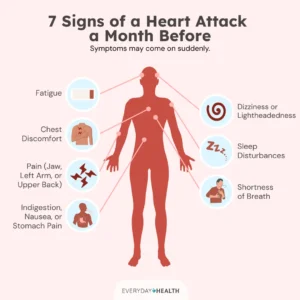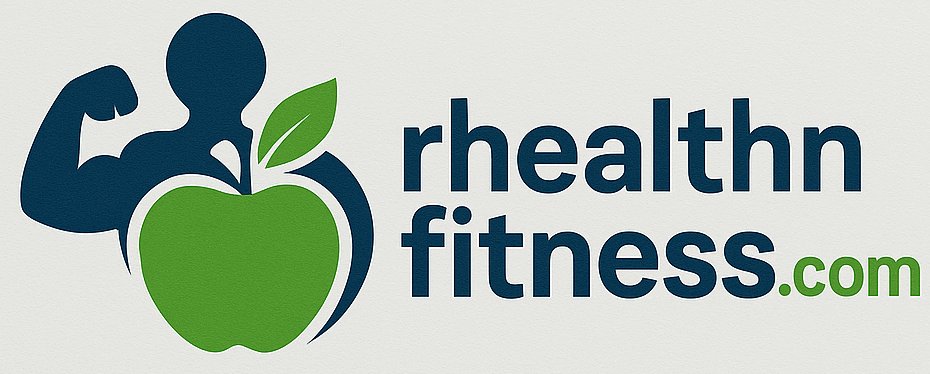7 Signs of a Heart Attack That Could Show Up a Month Before
While heart attacks can happen suddenly, sometimes symptoms present themselves weeks ahead of the cardiac event itself. Unusual fatigue, sudden shortness of breath, any chest discomfort, new sleep disturbances, and abnormal indigestion can all be early indicators of a heart attack. By knowing what symptoms to look for, you can identify early signs of a heart attack when they appear and seek medical attention proactively, potentially reducing the heart attack’s severity or preventing it entirely.
Potential Warning Signs of a Heart Attack a Month Before It Happens
Heart attacks don’t always strike suddenly and violently out of nowhere. In fact, the earliest signs of a heart attack can present weeks before the heart attack itself, giving you time to seek medical attention if you notice them.
“Even one of these symptoms can be enough to visit the emergency department if it’s new or different from something you’ve experienced before,” says Nisha Parikh, MD, MPH, a cardiologist at Northwell Health in Hyde Park, New York.
Dr. Parikh stresses that while many of these symptoms may not seem worthy of an emergency on their own, the suddenness of these symptoms during ordinary tasks is what makes them alarming.
1. Fatigue
Significant changes in your energy and tolerance for physical activity can be an indication of an impending heart attack.
“It’s different from regular tiredness because it’s the kind of fatigue or exhaustion that feels out of proportion to the amount of work you’re doing,” says Parikh. “If you’re exercising and you feel significantly more tired than usual, don’t ignore this glaring symptom.”
While the overall cause of this fatigue is decreased blood flow to the heart, experts say this precursor symptom is more common in women than men.
“There are many gender-based differences in the structure of the heart,” says Skyler St. Pierre, a Stanford University doctoral candidate who researches the mechanics of biological tissue in the Living Matter Lab in California.
2. Shortness of Breath
Shortness of breath is a common early sign of a heart attack, occurring as a result of the heart not pumping blood properly. Eventually, this dysfunction can cause fluid to build up in the lungs.
“It can also be due to reduced blood flow to the lungs,” says Parikh. “Many of my patients have experienced this symptom in the middle of the night, and it wakes them up.”
3. Chest Discomfort
This classic symptom of a heart attack can differ dramatically based on your gender. While portrayed in movies as a significant and sudden pain in the chest, Parikh says it’s not always so obvious.
“The pain can be mild to severe, and many people describe it as an anxious or nervous feeling in their chest,” she says. “Symptoms of an anxiety attack can mimic this same symptom of heart attack.”
Even if your chest discomfort isn’t persistent, you shouldn’t dismiss it.
4. Sleep Disturbances
The relationship between sleep and heart attacks is complicated.
First, insomnia and overall poor sleep quality are significant risk factors for a heart attack because of the stress they place on heart health. Experts also say early symptoms and actual heart attacks most commonly occur at night.
“Many heart attacks actually occur at 3 a.m. because that’s when adrenaline and cortisol levels surge,” says Parikh. “More often than not, we see heart attacks occurring at this time of day.”
5. Indigestion, Nausea, or Stomach Pain
“Oftentimes, that digestive discomfort happens because the bottom of the heart isn’t getting as much blood flow [as it should]. That part of your heart sits on the diaphragm and the stomach. That lack of blood flow can lead to nausea.”
Parikh says diarrhea and general changes in bowel movements can be an early indicator of a heart attack as well.
“Any abnormal nausea during your routine exercise habits can also be a big sign of an impending heart attack,” says Parikh.
6. Dizziness or Lightheadedness
“Dizziness can be related to reduced blood flow to the brain,” says Parikh. “We underestimate how hard the heart works to pump blood throughout the body, including the brain.”
“Women are more likely [than men] to experience this lightheadedness, and even fainting,” says Parikh.
7. Pain in Other Areas
While intense chest pain is usually the heart attack event itself, pain or discomfort in other areas of the upper body are more likely to present in the weeks preceding a heart attack and potentially during the heart attack itself, says Parikh.
When to See a Doctor
On their own, these early signs of a heart attack could be easily dismissed, but experts urge you to acknowledge when they arise suddenly and respond accordingly.
“Don’t wait for the classic symptom of chest pain,” says Parikh. “In real life, heart attack symptoms are more varied. And you shouldn’t wait until you’re experiencing multiple symptoms. If you’re experiencing even one of these symptoms and it’s new or different from what you’ve experienced before, you should take it seriously.”
Parikh and St. Pierre both recommend learning about your personal risk factors for heart attack and heart disease in order to better evaluate potential early signs. Key factors include:
When to See a Doctor
On their own, these early signs of a heart attack could be easily dismissed, but experts urge you to acknowledge when they arise suddenly and respond accordingly.
“Don’t wait for the classic symptom of chest pain,” says Parikh. “In real life, heart attack symptoms are more varied. And you shouldn’t wait until you’re experiencing multiple symptoms. If you’re experiencing even one of these symptoms and it’s new or different from what you’ve experienced before, you should take it seriously.”
Parikh and St. Pierre both recommend learning about your personal risk factors for heart attack and heart disease in order to better evaluate potential early signs. Key factors include:
- A family history of heart disease and heart attack
- Smoking more than one cigarette per day
- Having prediabetes or diabetes
- Having high LDL cholesterol
- Having high triglycerides
- Having high blood pressure
- Being a man and over 50 years old
- Being a woman and over 60 years old
Women should be especially vigilant about subtle symptoms, because women are less likely to experience intense chest pain and are also less likely to be promptly and accurately diagnosed with a heart attack.
“Several studies have shown that women are less likely to be diagnosed during a routine exam, even when they’re experiencing more severe symptoms than men,” says St. Pierre. “We are under-diagnosing women, and the existing screening methods aren’t catching the early signs of heart attack risk in women.”
The Takeaway
- Symptoms of a heart attack can appear weeks ahead of the cardiac event itself.
- Early warning signs include symptoms like fatigue, shortness of breath, chest discomfort, sleep disturbances, indigestion, dizziness, and pain in areas other than your chest like your jaw or back.
- Women tend to experience less traditional symptoms of a heart attack than men, including nausea, indigestion, and pain in areas other than the chest.
- Should any of these symptoms arise suddenly, even if you’re only experiencing one of them, reach out to your healthcare provider for further evaluation.
Resources We Trust
- Cleveland Clinic: How to Tell the Difference Between a Heart Attack and a Panic Attack
- Mayo Clinic: Heartburn or Heart Attack: When to Worry
- Johns Hopkins Medicine: A Woman’s Guide to Preventing Heart Disease
- American Heart Association: Lifestyle Changes to Prevent a Heart Attack
- Centers for Disease Control and Prevention: Preventing Heart Disease

